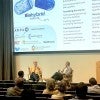
Digital Health Institute summit showcases Rice-Houston Methodist partnership in AI-driven medicine
The Digital Health Institute, a joint initiative of Rice University and Houston Methodist, held its inaugural summit Oct. 8 at Rice.

Digital Health Institute summit showcases Rice-Houston Methodist partnership in AI-driven medicine
The Digital Health Institute, a joint initiative of Rice University and Houston Methodist, held its inaugural summit Oct. 8 at Rice.

Exploring links between AI and the brain as Texas weighs Proposition 14
LLMs and the Brain, a symposium featuring researchers from Rice, Baylor College of Medicine, the University of Texas, the Georgia Institute of Technology, the University of Montreal and other institutions explored the intersection between neuroscience and AI. The conversation around brain research extends beyond the university and is unfolding at the state level. On Nov. 4, Texas voters will decide on Proposition 14, which would fund the Dementia Prevention and Research Institute of Texas (DPRIT) with $3 billion over 10 years, creating the largest state-funded dementia research program in the country.

New AI tool makes medical imaging process 90% more efficient
Rice researchers developed an AI tool that makes a medical imaging process 90% more efficient.

Rice's Ken Kennedy Institute hosted the fourth annual AI in Health Conference, convening over 550 attendees across the four-day event for plenary speaker sessions, networking and workshops that explored key areas for artificial intelligence-driven advancement across health and public health domains.

Rice hosts ARPA-H summit on future of implantable biohybrid devices
Rice hosted the second Advanced Research Projects Agency for Health Biohybrid Devices Summit Sept. 25-26 in Houston to support research and translation in implantable devices that function as “living pharmacies.”

Materials scientist Hautier named fellow of American Physical Society
Rice materials scientist Geoffroy Hautier has been elected a fellow of the American Physical Society for his work in high-throughput computational materials design and discovery.

New UTHealth Houston school highlighted at joint Rice-UTHealth workshop on AI and behavioral health
The Future of AI and Behavioral Health Workshop, a joint effort of Rice and UTHealth Houston, explored the intersection of artificial intelligence and behavioral health and served to spotlight the launch of UTHealth Houston’s new School of Behavioral Health Sciences.

Q&A: How Rice and Houston Methodist are building the future of digital health
Ahead of the Houston Methodist-Rice University Digital Health Institute Summit Oct.8, Rice News spoke with institute leadership about the institute’s vision, its distinctive assets and the opportunities it opens for the future of health care.

Innovative internship program equips Rice graduate engineers with industry experience
The Rice Center for Engineering Leadership launched the Summer Engineering Innovation Program, a 10-week interdisciplinary initiative where graduate students collaborated with engineering leaders from industry and community organizations to solve real-world engineering challenges.

Rice quantum scientist Hanyu Zhu is available to discuss chiral phonons, a rapidly-evolving research field with implications for electronic and quantum technologies, energy transport, advanced sensing and more.

New membrane extracts lithium from brines with greater speed, less waste
A team of researchers at Rice has developed a new membrane that selectively filters out lithium from brines, offering a faster, cleaner way to produce the element at the heart of nearly every rechargeable battery.

Scientists uncover room-temperature route to improved light-harvesting and emission devices
A team of researchers from Rice and collaborators have found a way to make two different phonons in thin films of lead halide perovskite interact with light so strongly that they merge into entirely new hybrid states of matter.

Brain inflammation treatment could be ally in fight against dementia
Scientists from Rice and Houston Methodist have developed a new way to reduce inflammation in the brain, a discovery that could help fight diseases such as Alzheimer’s and Parkinson’s.

New Digital Health Institute Summit spotlights health tech innovation Oct. 8
The Rice-Houston Methodist Digital Health Institute will host an inaugural summit Oct. 8 at Rice, launching what will become an annual gathering at the forefront of digital health and innovation.

Rice scientists use electrons to pattern light sources and wiring directly onto crystals
Rice researchers used a focused electron beam to pattern device functions with submicron precision directly into an ultrathin crystal.